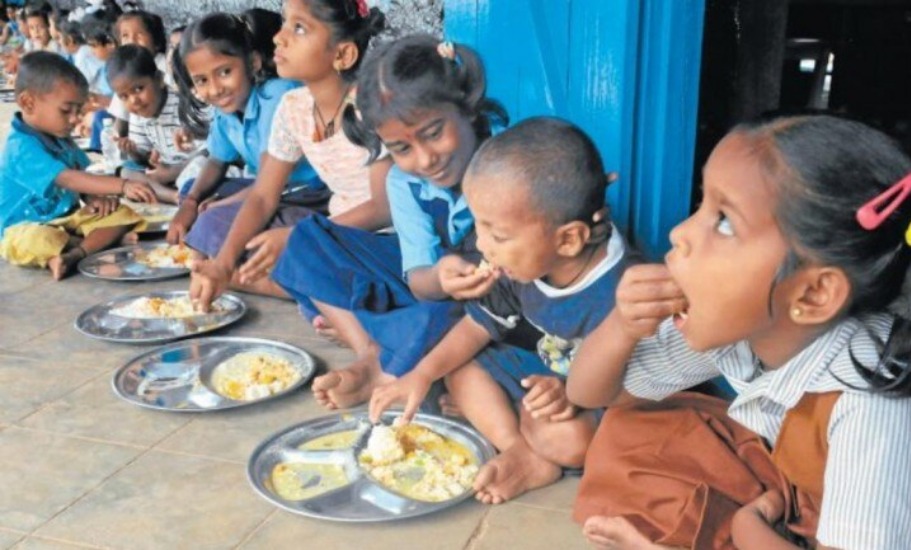
Bengal seeks CSR funds, plans fish farming to make mid-day meals appetising
State plans to improve scheme's quality and appeal by seeking CSR funds and promoting aquaculture in schools to enhance the nutritional value of food

The West Bengal government is exploring innovative solutions — ranging from tapping into Corporate Social Responsibility (CSR) funds to promoting aquaculture on surplus school land — to improve the appeal of the mid-day meal scheme.
This push follows a recent assessment report that revealed over 30 per cent of students missed their mid-day meals during the 2024–25 academic year, prompting the Centre to direct the state government to adopt urgent corrective measures.
In certain districts like Murshidabad, the coverage was below 50 per cent.
Targeted intervention
To improve the effectiveness of the scheme, the state’s mid-day meal project director has instructed all district magistrates to identify underperforming schools, especially those from socially, economically, and otherwise disadvantaged areas for targeted intervention.
Accordingly, 30 schools in each district have been selected so far for special support, according to an official in the project director's office.
Also Read: Kerala to review anganwadi food after child requests biryani, chicken fry
CSR funds are being sought for buying new utensils, as the conditions of cooking and serving utensils were found to be very poor in these schools, the official added.
“Initially as a pilot project, we will approach banking partners under the CSR framework for infrastructure development,” the official added.
Enhancing nutritional value
Admitting that existing daily per-student allocation is not enough to provide good nutritious meals, the official said apart from seeking CSR funds for infrastructure development, the state government is also exploring ways to enhance the nutritional value of the food served to students without increasing the financial burden.
Also Read: Tutor, clerk, peon, cook, surveyor: Unseen travails of Indian teachers
The daily per-student allocation for the mid-day meal is Rs 6.78 for primary students, and Rs 10.17 for upper primary students.
Key factors for decline
A recent survey conducted by the state government identified quality of food and irregularities in distribution as some of the key factors contributing to the massive drop in the number of students receiving mid-day meals in the state.
The mid-day meal coverage in the state has decreased by nearly 10 lakh students in the past one year, the Centre recently pointed out while seeking a report from the state.
The Samagra Shiksha Mission last week directed all schools to improve the quality of the food by utilising resources available with them.
Fish farming
The new directive states that in addition to cultivating vegetables, schools must also raise fish in ponds located within or near the school premises, so that fish can be included in the mid-day meals.
According to the directive, schools that already have ponds within their premises must start fish farming immediately. In the cases where schools have open fields, ponds should be dug in the available space, ensuring that designated play areas are preserved.
The mission has already approached the fisheries department to provide free training on fish farming and to supply small fingerlings at no cost.
Also Read: Millets will be included in Indira Canteens and mid-day meals: Karnataka CM
The initiative seeks to enhance the nutritional value of mid-day meals while integrating fish farming into school activities.
The idea of fish farming came to the mind after an inspection team found that Kankanagar Srishtidhar Institution in North 24 Parganas was successfully serving fish sourced from a pond on its own campus.
Kitchen gardens
Many schools in West Bengal are growing vegetables in kitchen gardens to boost nutrition and engage students in hands-on learning. These nutrition gardens, growing a variety of seasonal and exotic vegetables, are maintained by students with teacher supervision and are supported by government funding.
Around 13,500 schools are currently participating in the School Nutrition Gardens (SNG) programme. The state government allocates Rs 5,000 per school from the flexi fund to support the development of these gardens.
Also Read: PM POSHAN: Meagre funds, rising prices eat into meals' nutrition levels
Madanagar High School at Raina in East Burdwan district is a notable success story of the SNG programme. The school has transformed its rooftop into a thriving garden, growing exotic and nutritious crops such as dragon fruit.
Another standout example is the Children’s Welfare Association High School in Kolkata’s Behala area, where students are growing seasonal vegetables like cabbage, spinach, mushroom, cauliflower, and broccoli on their terrace.

